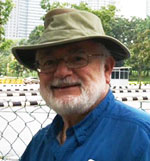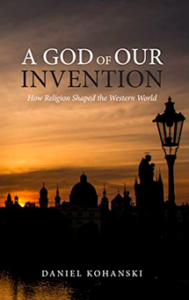Daniel Kohanski, A God of Our Invention, How Religion Shaped the Western World (Hannacroix, NY: Apocryphile Press, 2023) 285 pages, $26.00
By Oliver B. Pollak

RICHMOND, California — Daniel Kohanski graduated from Colgate with a degree in philosophy and received an MS in computer science from Rutgers. He spent many years as a computer programmer and five years in the Foreign Service. He published The Philosophical Programmer: Reflections on the Moth in the Machine with St. Martin’s Press in 1998.
Kohanski wrote A God of Our Invention because he had long been “bothered by the conflicts between the Bible and recorded history.” The proposes the way “to resolve these kinds of questions is to write a book about them.” The result of his lifelong fascination with history and religion is guided by several precepts: William of Ockham (1287-1347), an English Franciscan friar is known for his rational “Occam’s razor;” Scottish Enlightenment thinker David Hume (1711-1776) coined Hume’s Maxim; and doubt, the prerequisite of the Scientific Revolution.
Much of the world is imbued with religious faith and professes to believe in a God that cannot be seen, touched, smelled, tasted or heard. Kohanski concludes, lacking empirical and verifiable observation, God does not exist. He is driven to test the concepts and alleged deeds of the supernatural, polytheism, monotheism, messiahs, resurrection, prophesy, miracles, and the multiple times the world has failed to experience the predicted millenarian “end of days.”
Competing faiths, missionizing, conversions, church leaders, popes, rabbis, Martin Luther, debates and arguments, clashes between believers, fundamentalists, evangelicals, atheists, skeptics, agnostics, nonbelievers and unsaved challenge tolerance and equanimity.
 Genesis 1:27 declared “God created man in his own image.” Unseen God, Yahweh, Jehovah, Adonai, Hashem, supernatural beings or concepts can only be accepted by a leap of faith and unquestioned belief. Kohanski reverses the creation process, kings and priests made god in man’s image to meet the needs of the unknown and unpredictable including drought, famine, flood, plague, defeat in war, natural disasters, and earthquakes that could be blamed on the sinfulness of mankind and the lack of propitiation and sacrifice to the appropriate gods.
Genesis 1:27 declared “God created man in his own image.” Unseen God, Yahweh, Jehovah, Adonai, Hashem, supernatural beings or concepts can only be accepted by a leap of faith and unquestioned belief. Kohanski reverses the creation process, kings and priests made god in man’s image to meet the needs of the unknown and unpredictable including drought, famine, flood, plague, defeat in war, natural disasters, and earthquakes that could be blamed on the sinfulness of mankind and the lack of propitiation and sacrifice to the appropriate gods.
Kohanski suggests that modern religious zealots are like originalists who follow the historical first thoughts and utterances. What was identified as sin in the scriptures, is still sin, regardless of expansion of science, education, knowledge and understanding of biology and sexuality. The Jewish ultra-Orthodox and other fundamentalists and evangelicals go back in time to the sin in the Garden of Eden, the Ten Commandments, and the gospels to guide contemporary religious policy. Change offends the old believer, conservatives, people with vested interests in the economic, political, social and racial status quo. Kohanski states that “religious conservatives determined to reverse this accommodation to reality.”
Today the laws of almost 70 of the 195 sovereign nations criminalize homosexuality. Pope Francis supports the Biblical binary distinction of Adam and Eve, men and women, but accommodates modern scientific understanding of genetics, chromosomes and wishes of the heart, by recently declaring homosexuality is not a crime but is a sin. The U.S. Supreme Court in 2015 found same sex marriage constitutional. While these decisions seem to keep pace with changing mores, human diversity, the ostensibly secular plural state and pluralism, old believers are still offended and prone to claw back expansions of human and civil rights.
Abortion, evolution, sex education, marriage, women’s rights, civil rights, race relations, school curriculum and global climate change comprise subtly and shockingly religious and political lightning rods. Thus, after almost half-century of abortion rights bestowed by Roe v. Wade (1973) the Supreme Court obliterated it in 2022. And with regard to climate change and environmental protections, the religious are satisfied with inaction as God will preserve the earth or the second coming will make it a non-issue.
My bookshelves contain the Epic of Gilgamesh, Hebrew and Christian Bible, Koran, Book of Mormon, Mary Baker Eddy on Christian Science, and Karen Armstrong. In college I took The Bible as Literature, Primitive Religion, and The Reformation. Readings included Freud’s The Future of an Illusion, and The True Believer by Eric Hoffer. I have published about Buddhism, Christian Science and Jesuits, all persecutors or victims in the long trail of shedding blood in the name of God. The invention of God raises a “most important question…how can we be so eager to kill and die on the imaginary orders of an invented God?”
High Holy Days, funerals and Yahrzeit are special times of contemplation. God is a convenient spiritual concept, even if he/she does not exist. Organized religion provides a sense of communal belonging, social cohesion, moral benchmarks, and in the Jewish sphere 613 mitzvot or commandments of affirmative (what you should do) and negative (what you should not do) strictures. And, the Bible has many capital crimes.
Why did Christians want to convert the Jews and why did Jews resist. Christians want to save the Jews, Jews wanted to retain their satisfying traditions of a stateless monotheistic faith. They studied, learned, debated, disagreed and accommodated to the societies in which they were embedded. They adapted as Reform, Conservative, Reconstructionist, converted, lost faith and committed apostasy. Christians wanted to save the Jews from damnation, Jews were still waiting for the Messiah.
The depth of the chasm in Christian-Jewish relations appeared monstrously in 20th century Germany with the Nazi Final Solution, the extermination of the Jews. My German and Austrian family thought they could assimilate. They were wrong. The Holocaust instilled refugee faith in America rather than the divine.
Kohanski’s 1998 Philosophical Programmer contributes to the history of the computer revolution currently embroiled in Artificial Intelligence as ChatGPT (Chat Generative Pre-Trained Transformer) where computers respond to human posed questions with research papers. In 2023 Kohanski’s A God of Our Invention appears as Israel is governed by the most right-wing and ultra-Orthodox Jews since the State’s founding in 1948. They might consider this book heresy.
Rational inquiry shines light on contemporary political-religious agendas bound to “ideologies of millennia past” and “held hostage to antiquity.” This book is a conversation. If it provokes doubt the author will have succeeded in sharing his quest.
*
Oliver B. Pollak, Ph.D., J.D., professor emeritus of history at the University of Nebraska at Omaha, a lawyer, and a member of the Institute for Historical Study, is a correspondent based in Richmond, California. He may be contacted at oliver.pollak@sdjewishworld.com.